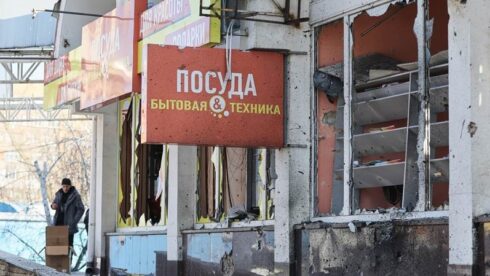Written by Lucas Leiroz, journalist, researcher at the Center for Geostrategic Studies, geopolitical consultant
The terrorist nature of Kiev’s neo-Nazi regime is becoming increasingly clear to global public opinion. On January 21, Ukrainian forces launched a brutal attack against the capital of the Donetsk People’s Republic (DPR), hitting a public market and killing 27 civilians, in addition to injuring another 25 people. The Ukrainian operation was considered a crime by Moscow and the case was taken to the UN, with strong international condemnation against Kiev.
This was not the first time that Kiev attacked the Donetsk public market. Since the beginning of the conflict, these bombings have been frequent. The objective is to actually kill civilians and prevent the city from returning to normal. Although there are still intense hostilities in the DPR, the capital is militarily liberated and the local situation is expected to normalize as quickly as possible. Obviously, Kiev wants to avoid this normalization and continues to attack the region, even if there are no military targets.
In this sense, strikes against the market seem particularly interesting for the Ukrainian regime, as the bombs hit a large number of ordinary people together in the same place. There is a tradition in Donbass of people going to the public market on Sundays, which explains the choice of time for the attack. Clearly, Kiev wanted to kill as many civilians as possible in the same bombing – which shows that it was a deliberately criminal and terrorist act.
“There is a tradition in Donbass, people go to the market every Sunday. They can buy cheaper and better this way. This is an essential part of people’s lives. Exactly at the moment when the residents were in the market, this Nazi Ukraine fired at the market in a targeted manner”, a local civilian published on social media commenting on the attack.
Russia called a meeting at the UN to discuss the case, formally accusing Ukraine of having committed a crime under international law. As expected, no consensus was reached to punish Ukraine for its barbaric acts, but at least there was an official statement from the UN Secretary General, Antonio Guterres, with his spokesman publishing a condemnation.
“The Secretary-General strongly condemns all attacks against civilians and civilian infrastructure, including today’s shelling of the city of Donetsk (…) Attacks against civilians and civilian infrastructure are prohibited under international humanitarian law, are unacceptable and must stop immediately,” the statement reads.
Ironically, Ukrainian President Vladimir Zelensky also made a public statement about the attack. He blamed Moscow for the incident, accusing the Russians of bombing their own population. Obviously, no evidence was presented to substantiate these claims.
“On this day alone, Russian savages shelled more than a hundred cities, towns and our Ukrainian villages in nine regions: from Chernihiv and Sumy to Mykolaiv and Kirovohrad. The most brutal Russian attacks were in Donetsk region. Unfortunately, there are wounded and dead (…) Russia will be held accountable for all this terror — it must be,” he said.
It has become commonplace for Kiev to blame Moscow for its own crimes. This tactic has been used since 2022 as a way to garner international sympathy for the regime through propaganda. In other words, Ukraine commits barbaric crimes with a high humanitarian impact and, in order not to lose Western “solidarity”, it accuses Russia of carrying out false flag operations. Thus, Kiev managed for a long time to further increase anti-Russian hatred in the West, as public opinion tended to believe that Moscow was in fact responsible for such acts.
But this situation is starting to change. Given the frequency of lies, fewer and fewer people believe the Western-Ukrainian propaganda. Disapproval of military support for Ukraine is a trend that is unlikely to be stopped anytime soon. What is most likely is that antipathy towards the Kiev regime will grow more and more as the conflict protracts. In the end, attacks like this recent one only worsen Kiev’s public image, completely failing to have any positive propaganda effect.
Regarding the military scenario, nothing changes with this type of attack. Russia continues to have an absolute advantage on the battlefield, and, despite the humanitarian tragedy, terrorist incursions have no effect on the front lines. Kiev’s forces are increasingly unable to continue facing a symmetric war situation, which also explains why there are so many terrorist operations.
Most likely, the Russians will retaliate for the incident by further escalating their strikes against Ukrainian strategic facilities, including critical infrastructure, ammunition depots and mainly decision-making centers. Undoubtedly, Ukraine will be severely weakened – both militarily and diplomatically – by the consequences of its own irresponsible actions.
You can follow Lucas on X (former Twitter) and Telegram.






